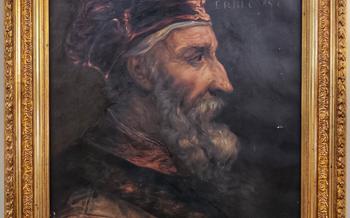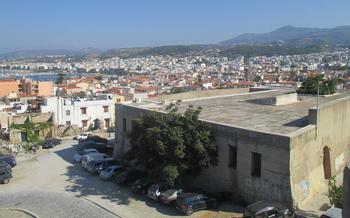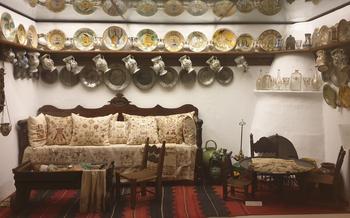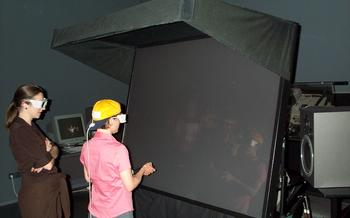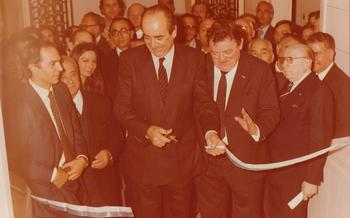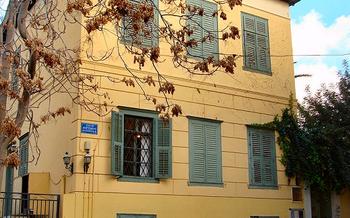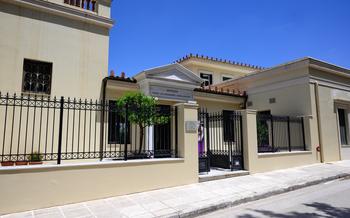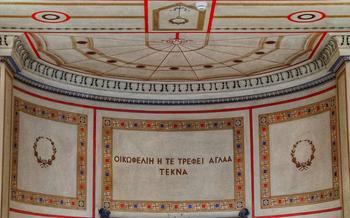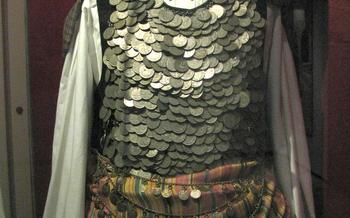
Pavlos Vrellis Museum of Greek History
- The Pavlos Vrellis Museum of Greek History
- Location and Accessibility
- Exhibitions and Collections
- Historical Significance
- Educational Programs
- Cultural Events
- Research and Publications
- Architecture and Design
- Visitor Services
- Online Presence
- Community Involvement
- Future Plans and Developments
- Tips for Visitors
- Insider Tip:
The Pavlos Vrellis Museum of Greek History
The Pavlos Vrellis Museum of Greek History is a treasure trove of Greek heritage and culture, nestled in the picturesque city of Kozani, Greece. Founded in 1966 by the passionate historian and collector Pavlos Vrellis, the museum has become a renowned institution dedicated to preserving and showcasing the rich history of Greece from ancient times to the present day.
Vrellis, driven by his profound love for Greek history, meticulously gathered an impressive collection of artifacts and documents over several decades. Recognizing the importance of sharing this wealth of knowledge with the public, he established the museum as a means to educate and inspire visitors from all walks of life. Today, the Pavlos Vrellis Museum stands as a testament to his dedication and serves as a vital resource for scholars, students, and history enthusiasts alike.
The museum's collection encompasses a diverse range of artifacts, including ancient pottery, weapons, jewelry, manuscripts, and historical documents. These precious items offer a tangible connection to the past, shedding light on the cultural, social, and political developments that have shaped Greece throughout the centuries.
Location and Accessibility
The Pavlos Vrellis Museum of Greek History is conveniently located in the heart of Kozani, a picturesque city in northern Greece. Visitors can easily reach the museum using various means of transportation.
Address: Pavlos Vrellis Museum of Greek History, 2 Vasilisis Olgas Street, Kozani, Greece.
Public Transportation: The museum is well-connected by public transportation. Visitors can take bus lines 1, 2, or 3 from the Kozani bus station, which is a short walk from the train station.
Driving: For those traveling by car, the museum is accessible via the Kozani-Ptolemaida National Road. There is ample parking space available near the museum, including designated spaces for visitors with disabilities.
Accessibility: The Pavlos Vrellis Museum of Greek History is committed to providing an accessible and inclusive environment for all visitors. The museum is fully wheelchair accessible, with ramps, elevators, and accessible restrooms.
Operating Hours and Admission: The museum is open to the public from Tuesday to Sunday, from 9:00 AM to 5:00 PM. Admission fees are minimal, with discounts available for students, seniors, and families.
Exhibitions and Collections
The Pavlos Vrellis Museum of Greek History houses a rich and diverse collection of artifacts that span various periods of Greek history, from ancient to modern times. Thematic exhibitions guide visitors through different eras, showcasing significant events, cultural achievements, and the evolution of Greek society.
Among the highlights of the collection are rare weapons, pottery, jewelry, and manuscripts that offer valuable insights into the daily lives, beliefs, and artistic expressions of the ancient Greeks. Interactive displays and multimedia presentations enhance the visitor experience, providing additional information and context for the artifacts on display.
Temporary exhibitions and special events add variety to the museum's offerings, showcasing new acquisitions, exploring specific historical themes, or highlighting the work of contemporary Greek artists and scholars. These events offer visitors the opportunity to delve deeper into Greek history and culture and engage with experts in the field.
Historical Significance
The Pavlos Vrellis Museum of Greek History plays a vital role in preserving and presenting the rich history and culture of Greece. Its collection of artifacts, documents, and exhibits offers a comprehensive overview of Greek history, from the ancient civilizations of Minoan and Mycenaean Greece to the modern era.
Among the highlights of the collection are rare artifacts and documents that shed light on important historical events. These include ancient pottery and tools that provide insights into the daily lives of ordinary Greeks, as well as weapons, armor, and military equipment that tell the story of Greece's military prowess and struggles for independence.
The museum also houses a collection of manuscripts, maps, and other documents that document the political, social, and cultural developments of Greece throughout the centuries. These documents offer valuable insights into the lives of famous Greek figures, such as Alexander the Great, Aristotle, and Plato, as well as the ordinary people who shaped the course of Greek history.
The Pavlos Vrellis Museum of Greek History has received numerous awards and recognition for its work in preserving and promoting Greek history. These awards include the Greek National Tourism Organization Award for Excellence in Tourism and the European Museum of the Year Award.
Educational Programs
The Pavlos Vrellis Museum of Greek History is committed to promoting education and fostering a deeper understanding of Greek history and culture. To achieve this, the museum offers a range of educational programs tailored to diverse audiences, from school groups to the general public.
Guided tours led by knowledgeable museum educators provide visitors with an immersive and engaging experience, allowing them to explore the museum's collection in-depth and gain insights into the historical significance of the artifacts. These tours can be customized to suit the specific interests and needs of each group, ensuring a personalized and enriching learning experience.
In addition to guided tours, the museum offers a variety of workshops and educational activities designed to engage and inspire learners of all ages. These workshops cover a wide range of topics related to Greek history, such as ancient Greek mythology, traditional crafts, and the role of women in ancient Greece. Through hands-on activities and interactive presentations, participants gain a deeper understanding of Greek culture and its enduring legacy.
To support educators in their teaching of Greek history, the museum provides a wealth of educational resources and materials. These resources include lesson plans, worksheets, and multimedia presentations that can be easily integrated into classroom curriculums. By collaborating with educational institutions and organizations, the museum ensures that its educational programs reach a wider audience and contribute to a deeper understanding of Greek history among students and educators alike.
Through its educational outreach programs, the museum brings its collection and knowledge beyond its walls, reaching communities and individuals who may not have the opportunity to visit the museum in person. These programs include traveling exhibitions, lectures, and workshops conducted in schools, libraries, and community centers. By expanding its educational reach, the museum plays a vital role in promoting the preservation and understanding of Greek history and culture for future generations.
Cultural Events
The Pavlos Vrellis Museum of Greek History is not just a repository of artifacts and historical knowledge; it is also a vibrant cultural hub that hosts a variety of events and programs that bring Greek history and culture to life.
Throughout the year, the museum organizes lectures, seminars, and conferences on diverse topics related to Greek history, archaeology, and culture. These events feature renowned historians, scholars, and experts who share their insights and knowledge with the public. Visitors have the opportunity to engage in thought-provoking discussions, ask questions, and gain a deeper understanding of Greek history and its significance.
In addition to lectures and seminars, the museum also hosts film screenings, art exhibitions, and musical performances that draw inspiration from Greek culture and history. These events provide visitors with a multisensory experience that allows them to immerse themselves in the richness and diversity of Greek heritage.
Special events and festivals are also held at the museum to celebrate Greek traditions and holidays. These events showcase traditional music, dance, food, and crafts, offering visitors a chance to experience the vibrant and festive spirit of Greek culture firsthand.
The museum's cultural events provide visitors with opportunities to engage with historians, curators, and other experts, gaining insights and perspectives that enrich their understanding of Greek history and culture. These events foster a sense of community and create a platform for dialogue and exchange, making the museum a dynamic and engaging space for cultural exploration and learning.
Research and Publications
The Pavlos Vrellis Museum of Greek History is not only a repository of artifacts but also a vibrant center for research and scholarship. The museum collaborates with universities and research institutions around the world to conduct in-depth studies on various aspects of Greek history and archaeology. These collaborations have resulted in the publication of scholarly journals, books, and catalogs that have enriched our understanding of Greece's rich past.
In addition to traditional publications, the museum embraces digital initiatives to make its research and resources accessible to a wider audience. Through its website and online platforms, the museum offers virtual tours, online exhibitions, and educational resources that allow visitors from all over the world to explore the museum's collection and engage with its research findings.
The museum's commitment to research and scholarship has earned it recognition and respect within the academic community. It has received grants and funding from prestigious organizations to support its research projects, and its publications have been cited and referenced by scholars worldwide. The museum's contributions to the field of Greek history have been acknowledged through awards and accolades, solidifying its reputation as a leading institution in the study and preservation of Greece's cultural heritage.
Architecture and Design
The Pavlos Vrellis Museum of Greek History is housed in a striking modern building that seamlessly integrates with the surrounding landscape. Designed by renowned architect Ilias Kouvelis, the museum's structure is a testament to the harmonious blend of contemporary aesthetics and respect for the natural environment. The building's clean lines, geometric forms, and use of natural materials, such as stone and wood, create an elegant and inviting space for visitors to explore Greek history.
The museum's design also incorporates sustainable elements, reflecting its commitment to environmental responsibility. Large windows allow natural light to flood the interior spaces, reducing the need for artificial lighting. Skylights strategically placed throughout the building provide additional natural illumination, creating a bright and airy atmosphere. The museum's green roof, covered in vegetation, helps to regulate the building's temperature and provides insulation, reducing energy consumption.
Accessibility features are thoughtfully incorporated into the museum's design, ensuring that all visitors can fully enjoy the exhibits. Ramps, elevators, and wide corridors accommodate visitors with mobility challenges, while clear signage and tactile maps assist visually impaired visitors in navigating the museum. The museum's commitment to inclusivity ensures that everyone has the opportunity to learn about and appreciate Greek history.
Visitor Services
The Pavlos Vrellis Museum of Greek History offers a range of visitor services to enhance the museum experience. Visitors can browse the museum's gift shop for souvenirs and educational materials related to Greek history and culture. The café provides a relaxing space to enjoy a snack or beverage while discussing the exhibits with fellow visitors. The museum also boasts a well-equipped research library, open to the public, which houses an extensive collection of books, journals, and other resources on Greek history.
Multilingual staff members are available throughout the museum to assist visitors with inquiries and provide guidance. Guided tours are offered in various languages, allowing visitors to delve deeper into the museum's collection and learn more about the fascinating stories behind the artifacts. For visitors with disabilities, the museum offers accessibility services such as ramps, elevators, and wheelchairs. Information desks and interactive kiosks are strategically placed throughout the museum, providing visitors with assistance, guidance, and information about the exhibits.
Online Presence
The Pavlos Vrellis Museum of Greek History maintains a comprehensive online presence, allowing visitors to engage with the museum's collection and resources from anywhere in the world. The museum's website serves as a gateway to its digital offerings, providing detailed information about exhibitions, events, and educational programs. Virtual tours and online exhibitions allow users to explore the museum's collection in immersive and interactive ways. The website also features a wealth of educational resources, including articles, videos, and downloadable materials for teachers and students. Visitors can purchase tickets and make reservations online, ensuring a seamless and convenient museum experience.
The museum's social media channels, such as Facebook, Twitter, and Instagram, provide real-time updates on upcoming events, new acquisitions, and behind-the-scenes glimpses into the museum's work. Engaging content, interactive polls, and educational quizzes keep followers engaged and informed. The museum also utilizes social media to promote its educational programs and outreach initiatives, reaching a broader audience and fostering a sense of community among history enthusiasts.
Community Involvement
The Pavlos Vrellis Museum of Greek History is not just a repository of artifacts and knowledge; it is also a vibrant community hub that actively engages with the local population. The museum fosters strong partnerships with local schools, businesses, and organizations to promote Greek history and culture. Through outreach programs, the museum brings its collection and expertise to a wider audience, inspiring a sense of pride and connection to the region's rich heritage. Volunteer opportunities are available for individuals who are passionate about history and wish to contribute to the museum's mission. By embracing community involvement, the Pavlos Vrellis Museum of Greek History plays a vital role in preserving and celebrating the cultural identity of Kozani and the surrounding region.
Future Plans and Developments
The Pavlos Vrellis Museum of Greek History is constantly evolving and expanding to provide visitors with new and innovative experiences. Upcoming exhibitions will focus on various aspects of Greek history, including the Byzantine Empire, the Ottoman period, and the modern Greek state. The museum is also planning to renovate and expand its facilities to accommodate a growing number of visitors and enhance the overall visitor experience.
Collaborations and partnerships with other institutions and organizations will further the museum's mission to promote Greek history and culture. These collaborations may include joint research projects, educational programs, and cultural events. The museum is also exploring new technologies and digital initiatives to make its collection and resources more accessible to a global audience.
The Pavlos Vrellis Museum of Greek History envisions a future where it is recognized as a leading international institution for the study and preservation of Greek history. Through its exhibitions, programs, and research initiatives, the museum will continue to inspire and educate visitors from around the world, fostering a deeper appreciation for the rich cultural heritage of Greece.
Tips for Visitors
To make the most of your visit to the Pavlos Vrellis Museum of Greek History, plan to spend at least two hours exploring the exhibitions. Arrive early in the morning or late in the afternoon to avoid crowds, especially during peak tourist season.
Dress comfortably and appropriately for a museum visit. While there is no strict dress code, it is advisable to avoid wearing shorts or tank tops out of respect for the historical artifacts on display.
Photography and videography are permitted inside the museum, but flash photography and tripods are not allowed. Be mindful of other visitors when taking photos and videos, and avoid blocking their view of the exhibits.
To fully immerse yourself in the museum's offerings, consider joining a guided tour. Guided tours are available in multiple languages and provide valuable insights into the history and significance of the artifacts on display.
Enhance your visit by taking advantage of the museum's educational programs and resources. Guided tours and workshops are available for school groups and the general public, and educational materials are provided for teachers and students.
Before your visit, check the museum's website for information on upcoming events, temporary exhibitions, and special programs. These events offer a unique opportunity to engage with historians, curators, and other experts in the field of Greek history.
Insider Tip:
For a unique experience, ask about the museum's special "Behind-the-Scenes" tour. This exclusive tour takes visitors to restricted areas of the museum, including the conservation lab and the museum's storage facilities. Visitors will have the opportunity to see artifacts that are not on display, learn about the museum's preservation and conservation practices, and gain insights into the work of the museum staff. This tour is offered only on a limited basis and requires advance booking. So, be sure to inquire when you visit the museum.
